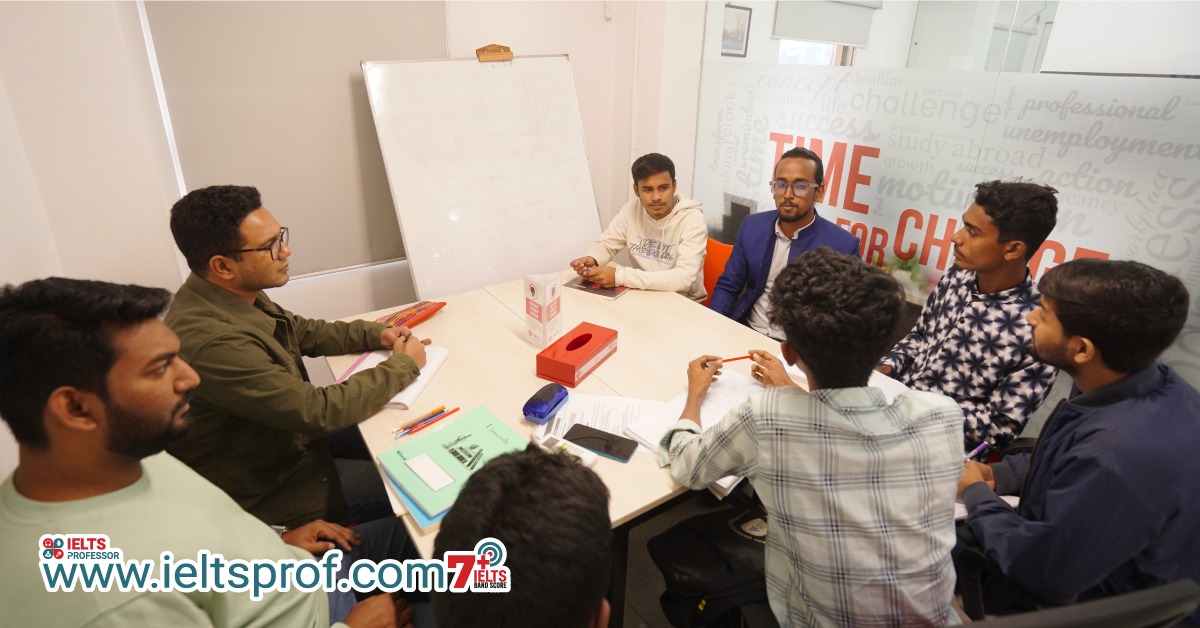
Achieving a perfect score of 9 in IELTS Speaking is a dream
for many students, and I was no different. I remember the anxiety and
excitement that overwhelmed me as I prepared for this challenge. As a
Bangladeshi student, the pressure of excelling in an international exam like
IELTS seemed daunting. I knew I would need a high score to open doors to higher
education abroad, especially in Speaking, where many students struggle.
In this article, I will share the strategies and techniques
I used to score 9 in IELTS Speaking. I will break down the preparation process
into easy-to-understand steps, share personal anecdotes from my experience, and
offer practical advice for Bangladeshi students aiming for the same. My goal is
to provide you with the tools necessary and inspire you with stories of fellow
students who overcame various challenges, such as financial constraints and
cultural differences, to achieve their dream scores.
You see, scoring 9 in IELTS Speaking is not impossible. With
the right mindset, strategy, and practice, anyone can achieve it. But how did I
score 9 in IELTS Speaking? Let me walk you through the process step by step and
share the insights I gathered along the way.
Understanding IELTS Speaking: What Is It Really About?
Before diving into the preparation process, it's essential
to understand what IELTS Speaking entails. IELTS Speaking is one of the four
sections of the IELTS exam, and it tests your ability to communicate
effectively in English. The Speaking test is conducted in a face-to-face
interview format, which can be intimidating for many students, particularly
those not used to speaking English regularly.
The test is divided into three parts:
- Part
1 – The Introduction (4-5 minutes): This is the warm-up section where
the examiner will ask general questions about your life, hobbies, and
background. For example, they might ask about your hometown, favorite
food, or daily routine.
- Part
2 – The Long Turn (3-4 minutes): In this section, you are given a
topic on a task card. You'll have one minute to prepare and make notes,
after which you need to speak for 1-2 minutes on the topic.
- Part
3 – The Discussion (4-5 minutes): This part involves a deeper
discussion on the topic from Part 2, with more complex questions that test
your ability to discuss abstract ideas and express opinions on social,
cultural, or global issues.
To score well in IELTS Speaking, it's essential to
demonstrate fluency, coherence, and the ability to express ideas clearly. But
most importantly, you need to sound natural while speaking. That's what I
learned early on and incorporated into my preparation.
How I Scored 9 in IELTS Speaking: My Journey
When I first began preparing for IELTS, I was confident in
my English skills. I had studied English in school and had a firm grasp of the
language, but the IELTS Speaking section was different. It wasn't just about
speaking; it was about speaking in a way that was fluid, natural, and
reflective of a high level of proficiency.
Step 1: Getting Comfortable with Speaking English
The first obstacle I had to overcome was my nervousness. I
knew I had to sound confident and natural, but I felt self-conscious every time
I spoke in English. This is a common challenge many Bangladeshi students face,
especially when English is not the primary language of communication at home or
school.
To overcome this, I consciously tried to practice speaking
English every day. I would talk to myself in the mirror, read books aloud, and
try to engage in conversations with friends and family who spoke English. Even
though these were informal situations, they helped me build the habit of
speaking in English.
Step 2: Learning to Think in English
One of my biggest challenges was translating my thoughts
from Bangla to English during the speaking test. It slowed me down and affected
my fluency. To fix this, I practiced thinking directly in English. Whether
during a conversation or when planning my day, I tried to express my thoughts
in English mentally.
For instance, when I was going to the market with my mother,
instead of thinking, "আমি
বাজারে যাচ্ছি" (I'm going to
the market), I would say to myself, "I'm going to the market to buy
vegetables." Gradually, I became more comfortable thinking in English,
significantly improving my fluency.
Step 3: Practicing with Mock Tests and Feedback
Another key factor in scoring 9 in IELTS Speaking was
practicing with mock tests. I found sample questions from previous IELTS
Speaking tests and simulated actual exam conditions. After recording my
answers, I would listen to them, paying attention to my pronunciation, grammar,
and vocabulary usage.
I also sought feedback from English-speaking friends and
teachers. For example, my friend Rafi, who had scored 8 in IELTS Speaking,
would often listen to my responses and point out areas for improvement. He
advised me on how to structure my answers and speak more clearly.
Step 4: Understanding the Scoring Criteria
To score well in IELTS Speaking, I knew it wasn't enough to
speak fluently. I had to ensure that I met the scoring criteria laid out by the
IELTS examiners. These include:
- Fluency
and Coherence: This means speaking naturally without unnecessarily
pausing and organizing your ideas logically.
- Lexical
Resource: This refers to the range of vocabulary you use. It's not
just about using big words but about using them appropriately.
- Grammatical
Range and Accuracy: This is all about using correct grammar and a
variety of sentence structures.
- Pronunciation:
Your pronunciation should be clear, and your accent should not affect
understanding.
Focusing on these criteria, I ensured my answers were
balanced and high quality. For example, when asked to describe my hometown, I
didn't just say, "It's a nice place." I elaborated with details,
using appropriate vocabulary like "picturesque," "vibrant,"
and "cultural heritage," all while keeping my sentences clear and
coherent.
Step 5: Overcoming Cultural Barriers
As a Bangladeshi student, I faced a unique challenge:
cultural differences. While I was comfortable speaking in my native language,
the local cultural context sometimes influenced how I expressed myself in
Bangla. For instance, when discussing abstract ideas or global topics, I had to
ensure that my responses were more universal and aligned with the expectations
of IELTS examiners.
This required me to stay updated on global issues and
practice expressing opinions on various topics in a way relevant to an
international audience. I followed international news, watched English news
programs, and discussed climate change, technology, and education with friends.
These discussions helped me develop a broader perspective and improve my
ability to discuss complex ideas in English.
Subheadings and Sections: Key Tips for Scoring 9 in IELTS Speaking
1. Practice Speaking Daily
One of the best ways to score high in IELTS Speaking is to
practice speaking daily. This helps build confidence and fluency. Find
opportunities to speak English with friends, family, or online language
partners.
2. Record Yourself and Listen
Recording your responses allows you to listen and work on
your mistakes. It helps you become aware of your strengths and areas for
improvement, making it easier to fine-tune your performance.
3. Expand Your Vocabulary
Using a wide range of vocabulary is essential for scoring
well in IELTS Speaking. Learn new words and expressions, and practice
incorporating them into your responses. For example, instead of saying
"good," try using words like "remarkable,"
"impressive," or "outstanding."
4. Work on Your Pronunciation
Clear pronunciation is essential. Focus on the sounds of
English, practice tongue twisters, and listen to native speakers. For example,
"She sells seashells by the seashore" is an excellent exercise for
improving pronunciation.
5. Focus on Fluency, Not Perfection
Many students get stuck trying to make their sentences
perfect. Instead, focus on speaking fluently. If you make a mistake, don't
worry about it. Just keep going, as the examiner will appreciate your ability
to maintain a smooth flow of conversation.
Conclusion
Scoring 9 in IELTS Speaking is achievable with the right approach, practice, and mindset. By following the steps outlined above, you can overcome the common challenges that many Bangladeshi students face in preparing for IELTS and ultimately achieve a score that opens doors to global opportunities.
FAQ Section
- How
can I overcome my nervousness during the IELTS Speaking test?
- How can I overcome my nervousness during the IELTS Speaking test?
- Practice
regularly, focus on speaking slowly and clearly, and remind yourself that
mistakes are okay.
- How
do I improve my fluency in IELTS Speaking?
- Speak
daily in English, record your responses, and converse with others.
- What
should I do if I don't know the answer to a question?
- Stay
calm, use your general knowledge, and answer to the best of your ability.
- How
can I expand my vocabulary for IELTS Speaking?
- Read
extensively, list new words, and practice using them in sentences.
- Is
it essential to have a native-like accent?
- No,
what matters is clarity. Focus on being understood rather than trying to
mimic a native accent.
- What
are some common mistakes in IELTS Speaking?
- Speaking
too fast, using incorrect grammar, and not answering the question
directly.
- How
can I improve my pronunciation?
- Practice
with tongue twisters, listen to native speakers and mimic their
pronunciation.
- Should
I use complex vocabulary in IELTS Speaking?
- Yes,
but only if it's appropriate. Don't force complex words; use vocabulary
that fits the context.
- Can
I use fillers like 'um' and 'uh' in IELTS Speaking?
- It's
best to avoid them. Try to think before speaking to reduce unnecessary
pauses.
- What
is the most essential tip for scoring 9 in IELTS Speaking?
- Practice
regularly and focus on maintaining a natural, fluent conversation.













